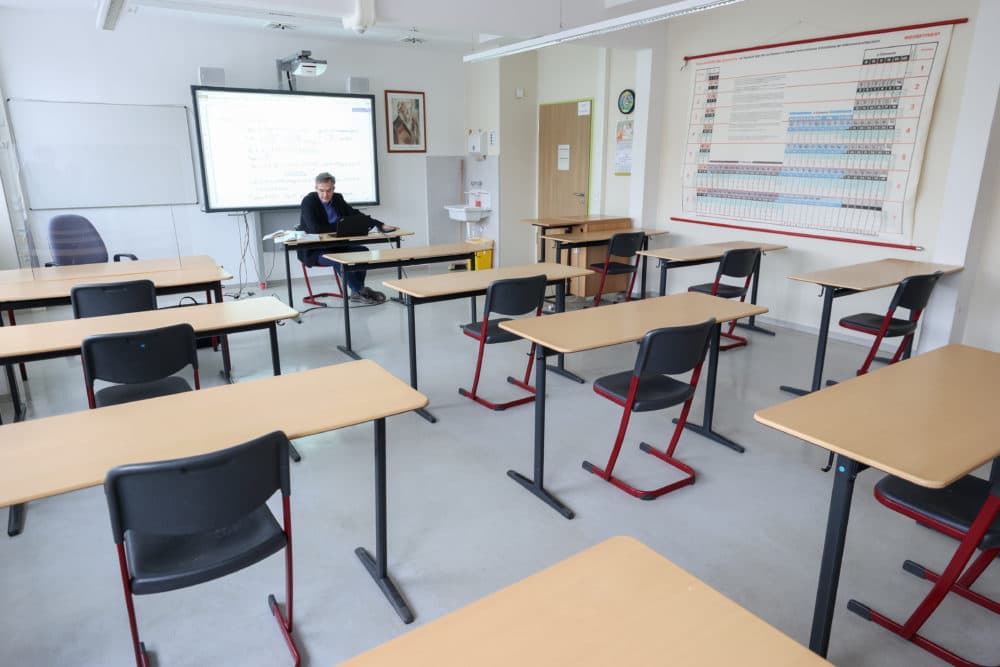Advertisement
Commentary
Don't Be Angry With Teachers For Wanting A Vaccine. Be Furious It's Taken This Long

As a Massachusetts teacher, I have whiplash.
Last week, Gov. Charlie Baker indicated that he’d like to bring elementary students back to class full-time in April — without first vaccinating educators. He said mass vaccination simply wasn’t necessary, not nearly as necessary as the administration of MCAS, the standardized test which students would, not coincidentally, return in time to take.
Then came this week's announcement. After President Joe Biden said school staff should be vaccinated by the end of the month, Baker reversed course. Educators are now eligible for vaccination at state sites starting next week. (And CVS, even sooner.)
I welcome this news, even if I hardly take it as proof of Baker’s change of heart. Forgive me. It’s March, and I’m jilted.
Teachers and our unions have gotten a bad rap lately: We’re obstructionists; we’re selfish. Truth is, teachers want their students learning safely in person just as much as their parents do.
In my poor urban district, hybrid and remote learning have proven catastrophically hard not only for my high school seniors, but also for me. I miss my kids and the relationships made uniquely possible by a classroom. I’ve never been so miserable.
'I have no motivation for school,' they tell me, again and again. I get it. Like them, I can hardly drag myself out of bed in the morning.
My students have turned in little remote work this year. They’ve logged on to our Google Meets erratically at best. “Yesterday ... ” I sometimes trail off, about to connect the previous lesson to today’s, before realizing I'm staring at an almost entirely different set of students that morning — the same empty black boxes, just different names.
When their cameras do wink on for attendance, I see my students horizontal in bed. If they mercifully unmute themselves to answer a question, I hear the booming voice of their sister’s chipper teacher: “Boys, and girls, you’re all doing an excellent job multiplying this morning.” They’re watching anime or playing Call of Duty. There’s a guinea pig out of its cage. A cat on the keyboard. They’re in the middle of a shift at the laundromat, AutoZone or Burger King — or they’re in their cars, just clocked out, or on a 15-minute break.
Admittedly, things were hard in my district before the pandemic. Students were chronically absent, juggled work and school and had limited access to technology. The pandemic only exacerbated every existing inequity.
My students do not all have a conducive place where they can work at home, and now all of school is homework. Handed a Chromebook for the first time, students have been overwhelmed by the sudden, strenuous demands of Google Classroom, email and a personal calendar. With money excruciatingly tight in so many households, some of them are drowning in credit card debt or working over 40 hours per week.
They’re in the middle of a shift at the laundromat, AutoZone or Burger King -- or they’re in their cars, just clocked out, or on a 15-minute break.
“I have no motivation for school,” they tell me, again and again. I get it. Like them, I can hardly drag myself out of bed in the morning.
Gov. Baker and Elementary and Secondary Education Commissioner Jeffrey Riley haven’t helped. In August, for example, Riley encouraged districts not to let teachers work from home, even if our students were remote. Our schools rank best in the nation, and still, the state doesn’t trust us. It hurts.
Of course, teachers don’t have a monopoly on misery in this pandemic, which has now dragged on for a year. I’m depressed, not naïve. In fact, most teachers have been lucky to keep our stable, often unionized jobs.
Still, we’ve been failed. We’ve been betrayed. We all have. We elect leaders to keep us safe, and we haven’t been — far from it. Federal and state governments let the virus surge, and surge and surge again. Over 500,000 Americans are dead.
We should all be furious, but not with teachers. Let’s direct our anger at the plutocrats responsible for the mess we’re in. That teachers around the country have advocated for themselves to be early recipients of the vaccine does not reflect poorly on us or our unions. Safe working conditions aren’t a luxury. Rather, it reminds us why all workers, especially essential workers, deserve strong unions in the first place.
... [State officials] remain hellbent on administering MCAS this spring, as if only its data could diagnose the losses our students have suffered.
Educators should not apologize for fighting for our safety. In the struggling city where I teach, the virus has spread viciously. I never got sick, but I can’t say the same for my co-teacher, boss, principal or superintendent.
Even the Centers for Disease Control and Prevention recommended including education workers in Phase 1B of the vaccine rollout, and while many states across the country did, Massachusetts wasn’t among them.
Educators should not apologize for fighting to keep our communities safe, either. My students have been sick; their family members have died. The science is mixed on the role of schools in virus transmission, but preliminary research suggests that — absent strong mitigation strategies — a child going to school in person increases their household’s risk of infection.
It’s a huge relief that educators will finally be vaccinated, but it’s disheartening that Baker’s hand had to be forced.
It’s also not surprising. Baker and Riley have often misunderstood the needs of students and teachers in this traumatic, chaotic year. They crow about students’ spiraling mental health, for example, but remain hellbent on administering MCAS this spring, as if only its data could diagnose the losses our students have suffered. (Here they align with President Biden, who disappointingly broke his campaign promise to reject the primacy of racist standardized tests and is insisting that, even this year, every state move forward with theirs.)
As students and educators return to our classrooms this year and next, we shouldn’t look to Baker or Riley for guidance on how best to care for ourselves and one another. Instead, we should look left and right. It’s up to us — educators, students and families — to transform our schools into real sites of healing, joy and love.
